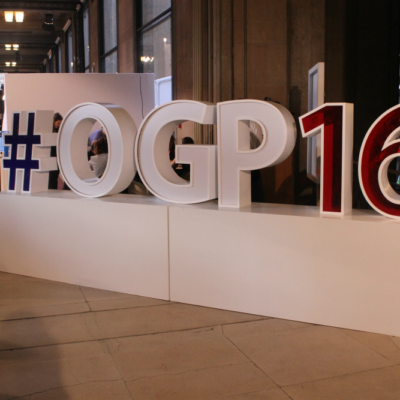Open Government Partnership pushes governments for more transparency and accountability
By Anna Romandash
Photos by Patricia Senge
Despite global crisis of democracy, more governments open their data and promote citizen participation. Through Open Government Partnership, they develop action plans alongside civil society representatives.
“Open Government Partnership is a global initiative, which brings together governments and civil society as well as businesses,” says Helen Derbishire, OGP Steering Committee member. The committee is OGP’s leading body that oversees open government developments in member states. It includes officials and civil society activists, who cooperate to develop action plans for the respective countries.
The initiative, launched in 2011 with eight original members, has grown to 70 governments all over the world. It started with national governments seeking solutions for disturbing world developments. “We have a crisis in democracy and journalism, and OGP has a space for discussing these topics,” says Derbishire, “It aims to keep the governments accountable when they do not deliver and pushes civil society to function better.”
“To join OGP, the countries have to comply with partnership requirements,” says Emilene Martinez, Civil Society Coordinator of Latin America, “They include budget transparency, access to information, disclosure of public officials’ assets, and citizen engagement.” The governments have to perform at least 75% in all of the spheres, with an independent unit evaluating how countries score in each area.
“Twice a year, OGP’s independent reporting unit publishes reports, which analyze the countries’ performance,” says Martinez. “This way, we keep governments accountable and evaluate their commitment to OGP standards,” she adds.
As a part of OGP, the governments develop actions plans with civil society members; and they have to implement them within two years. In 2016, the countries proposed 152 plans, with the main focus on open data and public accountability. The numbers grew comparing to 2015, when the governments proposed 109 action plans.
OGP, however, has no legal mechanisms to make the governments meet the partnership standards; it is up to the governments to comply with the rules. The only tool OGP leadership has is to inactivate country’s membership like it did with Turkey and Azerbaijan in 2016 because the governments did not meet the partnership requirements. The active countries also have different stances on openness of their data and access to the information.
“So far, the UK is the only country with open data on its companies; most countries keep it closed,” says Derbishire, “It is a very poor situation, and the improvement process goes very slowly.” OGP Paris Declaration, presented and signed in 2016 by member countries, aims to open such data internationally, but it does not compel the governments to do it.
For journalists, opening governmental data means more opportunities to investigate and hold officials accountable, but it can happen only in democratic societies. “Access to information is useless without free media,” says Derbishire, “Media freedom is essential to ensure that we have the right data and public discussions.” In countries, where media freedom is restricted, journalists may not have the opportunity to benefit from OGP achievements.
Although OGP membership has grown significantly, many countries still lag in implementing action plans. “In the beginning, OGP was just a cool club with Obama as a leader,” says Martinez, “But now, there are more opportunities in terms of funding projects and exchanging.”






